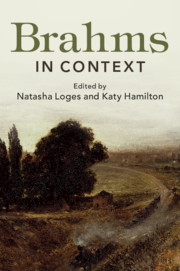Book contents
- Brahms in Context
- Brahms in Context
- Copyright page
- Dedication
- Contents
- Illustrations
- Music Examples
- Notes on Contributors
- Preface
- Abbreviations
- Part I Personality, People and Places
- Part II Identities, Environments and Influences
- Part III Performance and Publishing
- Part IV Society and Culture
- Part V Reception and Legacy
- Further Reading
- Index
- References
Part IV - Society and Culture
Published online by Cambridge University Press: 15 May 2019
- Brahms in Context
- Brahms in Context
- Copyright page
- Dedication
- Contents
- Illustrations
- Music Examples
- Notes on Contributors
- Preface
- Abbreviations
- Part I Personality, People and Places
- Part II Identities, Environments and Influences
- Part III Performance and Publishing
- Part IV Society and Culture
- Part V Reception and Legacy
- Further Reading
- Index
- References
Summary
We begin our consideration of Brahms’s politics and religion with the great historical turn that occurred in the centre of Europe in the year 1870. With the decisive German military defeat of France and proclamation of King Wilhelm I of Prussia as German Emperor, the German Question was at last given its definitive Prussian-dominated Smaller German solution. Brahms probably would have preferred a Larger German solution that included Austria, Prussia’s traditional rival for leadership in the loosely bound German Confederation that was established by the Congress of Vienna following Napoleon’s final defeat in 1815. But what mattered most was that Germany had at last emerged from its political impotence to become a nation-state possessed of power and influence in the world commensurate with its long-recognised achievements in the cultural sphere.
Keywords
- Type
- Chapter
- Information
- Brahms in Context , pp. 257 - 304Publisher: Cambridge University PressPrint publication year: 2019



